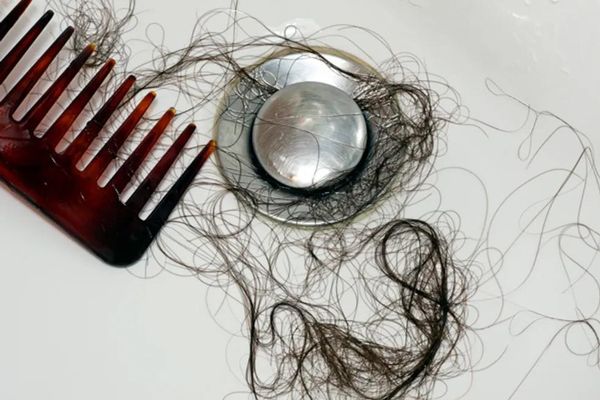It was the winter of 1989 when I went bald.
And though I knew in advance I’d lose my hair from the chemotherapy to treat my breast cancer, nothing prepared me for the feeling of being stripped completely bare of a significant share of my identity. The chemotherapy rendered every last strand of my hair a psychologically painful afterthought.
Fortunately, a few months after the chemotherapy ended, so did my experience with baldness. Just as the buds were blooming with the promise of spring, downy-soft hairs sprinkled my scalp, and in no time, I had a full head of hair. I embraced and celebrated every last strand, feeling once again complete.
Today, decades later, I’m dealing with hair loss again. Thankfully, this time it’s age — and not chemotherapy — but the unexpected shedding still stings. It's distressing to find fistfuls of hair left behind in a hairbrush or clogging a shower drain.
I’m in good (but unhappy) company: Hair loss affects about 1 in 3 women at some point in our lives. And while it’s natural to shed around 100 hairs a day, age and other factors have their own agenda and can speed up the loss while slowing down the gain.
To get to the root of the problem, we spoke to Elizabeth Liotta, M.D., a board-certified dermatologist and member of HealthyWomen’s Women’s Health Advisory Council, about hair loss and treatment options if you need help.
Who is affected by hair loss?
Any woman can be affected by hair thinning or loss, especially women over age 40, when hair growth slows and hair follicles eventually stop producing hair.
This can be really difficult. “As women, our hair is so important to our concept of beauty — hair loss or thinning is very traumatic,” Liotta said.
What causes hair loss in women?
There can be many different causes of hair loss for women. Besides aging and chemotherapy, other reasons include:
Androgenetic alopecia. This condition is known as female pattern baldness. It is a common form of hair loss that follows a specific pattern. In women, the pattern is a progressive widening of the area where you part your hair and thinning hair on the top and crown of the scalp.
Stress. Physical and emotional stress, including chronic illness, injury and relationship issues, can lead to temporary hair loss by coaxing the hair follicles into a “resting” phase, and stopping production of new hair strands. This is called telogen effluvium. “When the body is stressed, the phases of hair growth are shifted out of sync,” Liotta said.
Medications. For some people, hair thinning or loss can be a side effect of certain medications, which can include blood thinners, blood pressure meds and antidepressants.
Childbirth. After you give birth, your estrogen levels drop and your hair goes into the resting phase of growth. Hair shedding usually peaks about four months after giving birth, and for most women hair will grow back within a year.
Menopause or hormonal imbalances. Dropping levels of estrogen and progesterone can increase levels of androgens (male hormones). Shrinking hair follicles can cause hair to become finer, slow hair growth and speed up shedding.
Vitamin deficiencies. A lack of biotin, iron or zinc may affect hair follicles, leading to thinning or loss of hair.
Hair dyes and other hair processing agents. Over-processed hair is vulnerable to breakage, damage and subsequent loss.
Traction alopecia/traumatic alopecia. Over time, wearing your hair in tight braids or other styles that cause it to be pulled tightly away from the scalp can cause damage and loss. The great news: Your hair will usually grow back in once you change to a gentler form of styling.
Alopecia areata. This autoimmune condition is a skin disease where your body’s immune system attacks its hair follicles. Sometimes hair will regrow on its own, while other times corticosteroids or other treatments are necessary.
Read, “How I Learned to Love My Bald Self” >>
Thyroid disease. If your thyroid levels are too high (hyperthyroidism) or too low (hypothyroidism), it can cause hair loss. This type of hair loss is reversible if you treat the underlying condition.
Genetics. Both men and women can inherit hair loss genes that affect their hair follicles. The genes can come from your mother, father or both.
Covid hair loss. A prolonged bout with many illnesses, including Covid-19, can act as a stressor and push more hairs than normal into the shedding phase (known as telogen effluvium). Hair begins to fall out two to three months following the illness and the loss can last for six to nine months before it stops.
How can you tell what’s causing your hair loss?
Hair loss often has more than one reason. Because of that, Liotta suggests that a healthcare provider (HCP) should thoroughly evaluate you to figure out what’s going on.
They should look at your medical history, medications, nutritional status and hairdressing habits (dyes, gels, relaxers, hot irons) as well as give you a physical exam. In addition, blood tests and biopsies of your scalp can give your HCP a deeper look into what might be behind your thinning hair or baldness.
Hair loss treatments
While some hair loss may be cured or reversed, other times it may be permanent, depending on the cause. Hair loss treatments include:
- Topical or oral minoxidil
- Spironolactone
- Hair transplants
- Corticosteroids
- Immunotherapy
- JAK inhibitors
- Antiandrogens
- Low-level laser therapy or platelet-rich plasma (PRP)
Do natural remedies for hair loss work?
Some people swear by natural hair loss supplements. Others stand by ingredients like saw palmetto, iron, onion juice or pumpkin seed oil. Some studies show promising results for natural remedies but the numbers are small, and more research is needed to know if they really work. It’s also important to note that too much of certain nutrients (like vitamins A and E and selenium) may actually cause hair loss.
If you’re concerned about losing your hair, try to treat it gently, eat a healthy diet and talk to your HCP for ideas and treatment options.







